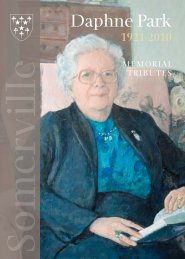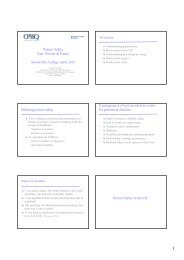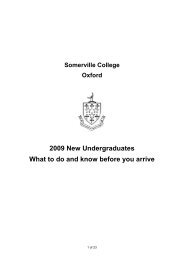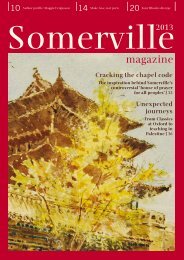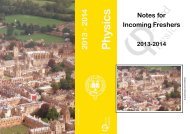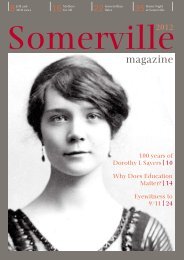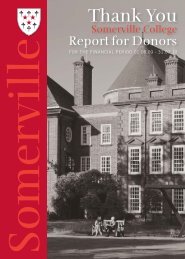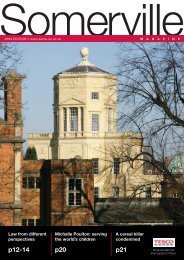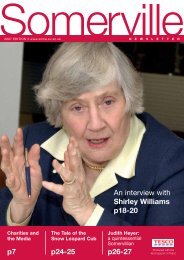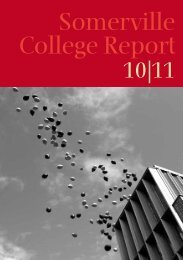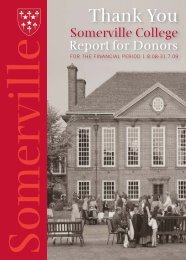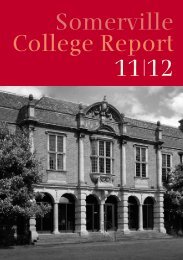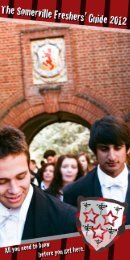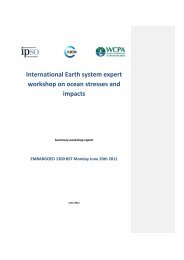magazine - Somerville College - University of Oxford
magazine - Somerville College - University of Oxford
magazine - Somerville College - University of Oxford
You also want an ePaper? Increase the reach of your titles
YUMPU automatically turns print PDFs into web optimized ePapers that Google loves.
<strong>Somerville</strong> Magzine | 29<br />
the electricity<br />
that seems to<br />
crackle through<br />
the Hall when<br />
Fiona stands up<br />
With thanks from <strong>Somerville</strong><br />
by JOANNA INNES<br />
Fiona Caldicott took over the leadership <strong>of</strong> a college<br />
still adjusting to its new role as a mixed institution;<br />
she leaves it a more settled and fl ourishing institution,<br />
in good heart for the challenges <strong>of</strong> our times.<br />
Perhaps Fiona’s resilience is her most remarkable<br />
feature, so essential to all that she has done, and so<br />
easily taken for granted in anyone who displays it.<br />
She has coped with a multitude <strong>of</strong> commitments with<br />
consistent seriousness and unfl agging determination.<br />
But the fact that, despite all the pressures upon her,<br />
she is always collected, always ready to reason her way<br />
through diffi culties, and always – in my experience <strong>of</strong><br />
talking many things over with her – ready to laugh, if<br />
<strong>of</strong>ten rather ruefully, shouldn’t be taken for granted; on<br />
the contrary, one has to wonder how she manages it.<br />
Five other things stand out for me about Fiona<br />
Caldicott’s principalship. These are, fi rst, her<br />
commitment to and interest in students, generally as<br />
young people, but also especially as students, who<br />
have assumed academic responsibilities which she<br />
encourages them to take very seriously. Second, her<br />
commitment to supporting the academic work <strong>of</strong><br />
Fellows, and to fi nding effective ways for the <strong>College</strong><br />
to function as an academic institution in a changing<br />
local, national and international environment. Third,<br />
her pr<strong>of</strong>essionalism, and desire to see the <strong>College</strong>’s<br />
fi nancial, material and administrative infrastructure<br />
maintained and managed to high pr<strong>of</strong>essional<br />
standards. Fourth, her highly developed sense <strong>of</strong> the<br />
duties <strong>of</strong> her position, and her tireless engagement<br />
with the many and varied practical and sociable<br />
responsibilities the principalship entails. Fifth, the<br />
high-pr<strong>of</strong>i le and demanding roles she has willingly<br />
taken on within the university.<br />
Space doesn’t allow me to develop these themes by<br />
more than a few vignettes. I think <strong>of</strong> the electricity that<br />
seems to crackle through the Hall when Fiona stands<br />
up to address, tease and adjure a packed crowd <strong>of</strong><br />
dining students. I think <strong>of</strong> what all tutors know is her<br />
unstinting willingness to grapple with the problems,<br />
academic and personal, that some students encounter:<br />
to make time for both tutors and students in these<br />
cases, sometimes at very short notice. She has been<br />
consistently supportive <strong>of</strong> all efforts to disburden fellows<br />
and tutors <strong>of</strong> tasks that can more effectively be done by<br />
others (despite her dislike <strong>of</strong> the rhetoric <strong>of</strong> ‘burdens’:<br />
‘burdens!’ she says; ‘these are your jobs’). She makes<br />
it plain that she values fellows’ academic achievements,<br />
and that she sees a role for the <strong>College</strong> in facilitating and<br />
encouraging these. She has worked consistently over<br />
the years with key administrative staff to develop clear<br />
and rigorous procedures and systems <strong>of</strong> reporting, and<br />
to promote strategic thinking about all aspects <strong>of</strong> the<br />
<strong>College</strong>’s activities. Among her most effective moments<br />
have been moments <strong>of</strong> crisis: it is evident how carefully<br />
and thoroughly she thinks through the challenges that<br />
such moments present, and how assiduous she is in<br />
making sure that lines <strong>of</strong> action agreed are followed<br />
through. She never hesitates to take a bull by the horns.<br />
The university duties she has taken on could have been<br />
a distraction, but she has never thought that there is any<br />
part <strong>of</strong> the Principal’s job that she can properly devolve.<br />
Her engagement with the <strong>University</strong> has enhanced her<br />
understanding <strong>of</strong> the wider environment within which<br />
academics and students move; we hope and believe<br />
that what she has learned about the daily realities <strong>of</strong> life<br />
in the university from her close knowledge <strong>of</strong> the college<br />
setting has informed her university work generally, and<br />
most specifi cally her work heading the Task Force on<br />
Academic Employment. Most recently, the network <strong>of</strong><br />
contacts she’s developed within the governing councils<br />
<strong>of</strong> the <strong>University</strong> and in university administration have<br />
helped the <strong>College</strong> collaborate effectively with these<br />
bodies in relation to our new building project on the<br />
Radcliffe Observatory site.<br />
It’s characteristic <strong>of</strong> Fiona that, as she prepares to<br />
complete her term as Principal, she should have<br />
taken on a major new challenge in the National Health<br />
Service. Never could it be said <strong>of</strong> her that she relishes<br />
an easy life. Nonetheless, she’s not incapable <strong>of</strong><br />
relaxing. Let’s hope that the future will provide her with<br />
pleasures both at work and at play.<br />
With thanks from <strong>Oxford</strong><br />
by STEPHEN GOSS<br />
To begin at the beginning, I fi rst met Dame Fiona<br />
at one <strong>of</strong> the <strong>College</strong>’s annual suppers for its out-<strong>of</strong>college<br />
tutors. I had been giving tutorials to <strong>Somerville</strong><br />
medics, as I had to medics at many other colleges,<br />
and I was pleasantly surprised to be invited: other<br />
colleges had never made the gesture. I was also<br />
delighted to discover just how well informed the<br />
Principal was about developments in the Medical<br />
School (I suspect I need not add that I found her well<br />
informed too about the individual progress <strong>of</strong> each<br />
<strong>of</strong> the <strong>College</strong>’s medical students!).<br />
This was a time when a new divisional structure<br />
was being proposed for the <strong>University</strong> and there was<br />
much discussion about the possible integration <strong>of</strong><br />
the Department <strong>of</strong> Experimental Psychology into what<br />
would become the new Medical Sciences Division.<br />
Given her background and the GMC’s concern that<br />
prospective doctors should be taught the psychology<br />
relevant to medical practice, it will be no surprise that<br />
Dame Fiona supported the possibility. It was not much



